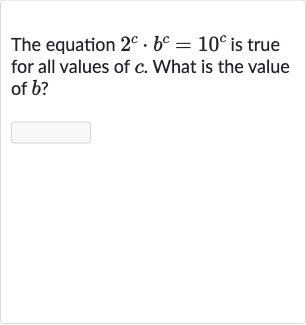Full solution
Q. The equation is true for all values of . What is the value of ?
- Given Equation Simplification: We are given the equation . We need to find the value of that makes this equation true for all values of .
- Expressing as : First, we can simplify the equation by using the property of exponents that states . We apply this property to the right side of the equation where can be expressed as . So, we rewrite as , which is equal to .
- Equating Bases with Same Exponent: Now we have . Since the equation must hold for all values of , we can equate the bases with the same exponent . This gives us .
- Concluding Value of B: Since for all , we can conclude that must be equal to , because if were not equal to , there would exist some value of for which would not equal .

